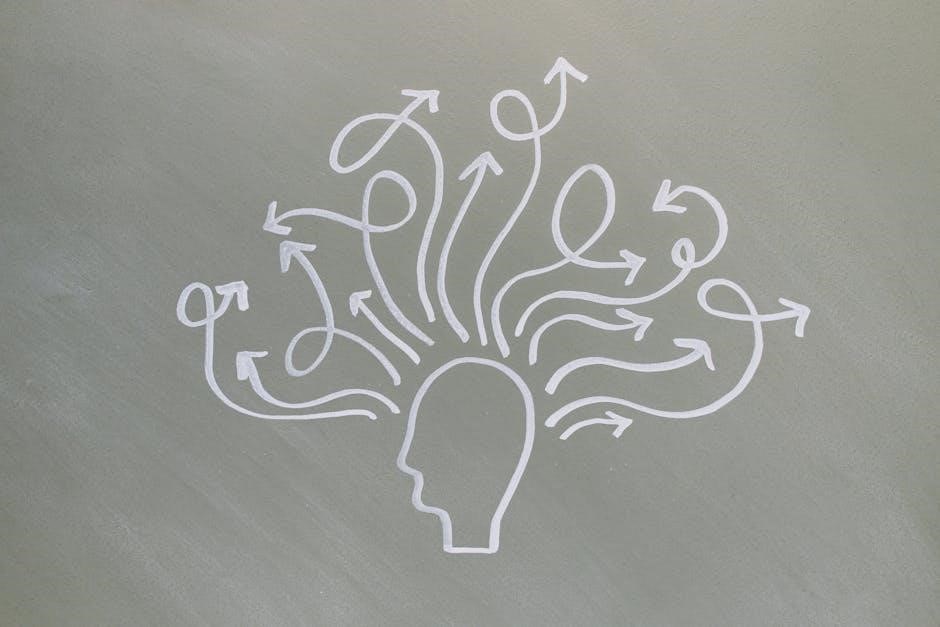
Overview of “Introducing Psychology 5th Edition PDF”
The 5th edition of “Introducing Psychology” offers a comprehensive exploration of psychological principles, research methods, and practical applications, providing students with a foundational understanding of the field.
1.1 Key Features of the 5th Edition
The 5th edition includes updated research, real-life examples, and interactive study tools, providing a comprehensive understanding of psychological concepts. It features sample answers, study guides, and digital resources to enhance learning, with a focus on critical thinking and practical applications in the field of psychology.
1.2 Structure and Organization of the Book
The 5th edition is structured into 11 chapters, each focusing on specific areas of psychology, from introductory concepts to advanced topics. The book begins with an overview of psychology, progressing through research methods, biological bases, cognitive processes, and applications in mental health and social interactions. Each chapter includes summaries, review questions, and case studies to enhance understanding and retention.
Main Areas of Psychology Covered
The book explores key psychological domains, including research methods, biological bases of behavior, sensation, perception, cognition, mental health, social interactions, and personal growth.
2.1 Research Methods in Psychology
The 5th edition details various research methods, including qualitative and quantitative approaches, experiments, and case studies. It emphasizes the importance of critical thinking and ethical considerations in psychological research, providing clear explanations of methodologies and their applications to real-world psychological inquiries.
2.2 Biological Basis of Behavior
The 5th edition explores the biological foundations of behavior, including the brain, nervous system, and neurotransmitters. It discusses how hormones, genetics, and evolutionary factors influence behavior, providing insights into the physiological underpinnings of psychological processes and their role in shaping human actions and emotions.
2.3 Sensation, Perception, and Cognitive Processes
This section delves into how humans process information through sensation and perception, examining the thresholds, sensory pathways, and perceptual biases that influence our understanding of the world. It also explores cognitive processes such as memory, attention, and problem-solving, highlighting the intricate mechanisms that enable thinking and learning.
Applications of Psychological Principles
Psychological principles are applied to enhance mental health, improve social interactions, and foster personal growth, providing practical strategies for real-world challenges and everyday life situations effectively.
3.1 Mental Health and Well-being
The 5th edition emphasizes mental health strategies, stress management, and emotional resilience. It explores evidence-based practices to promote well-being, addressing anxiety, trauma, and cognitive-behavioral therapies. Practical applications and real-life examples help students understand how psychological principles can enhance mental health and improve quality of life effectively and sustainably over time.
3.2 Social Interactions and Relationships
The 5th edition delves into the dynamics of social interactions and relationships, exploring how communication, empathy, and social influence shape human behavior. It examines evidence-based practices to foster positive connections, addressing topics like conflict resolution and cooperation. Understanding these principles helps individuals navigate interpersonal challenges and build stronger, more meaningful relationships in personal and professional settings effectively.
3.3 Personal Growth and Development
The book emphasizes the role of personal growth and development, offering insights into self-awareness, resilience, and goal-setting. It provides strategies to enhance emotional intelligence and well-being, enabling individuals to achieve their full potential. By understanding psychological principles, readers can foster personal development and lead more fulfilling lives through evidence-based practices and reflective learning strategies effectively.
Key Theories and Concepts
This section explores major psychological theories, such as cognitive-behavioral and humanistic approaches, alongside core concepts like motivation, memory, and learning, shaping understanding of human behavior and mental processes effectively.
4.1 Major Psychological Theories
The 5th edition delves into key psychological theories, including cognitive-behavioral, humanistic, and psychodynamic approaches. It explores theories of motivation, learning, and development, providing insights into the works of prominent psychologists like Beck, Rogers, and Freud. These theories are contextualized with real-world applications, enabling readers to understand their relevance in addressing mental health, behavior, and personal growth effectively.
4.2 Core Concepts in Psychology
The 5th edition emphasizes core psychological concepts such as sensation, perception, cognition, memory, emotion, and motivation. It explores how these elements interact to shape human behavior, providing a solid foundation for understanding psychological processes. Practical examples and case studies illustrate how these concepts apply to everyday life, enhancing comprehension and relevance for students.

Learning Resources and Study Aids
The 5th edition includes sample answers, study guides, and strategies to enhance learning. These resources help students grasp complex concepts and prepare for assessments effectively.
5.1 Sample Answers and Study Guides
The 5th edition provides detailed sample answers and comprehensive study guides. These resources offer clear explanations of key concepts, helping students understand expectations and excel in their psychology courses. They cover various topics, ensuring thorough preparation for assessments and fostering a deeper understanding of psychological theories and applications.
5.2 Strategies for Effective Learning
The 5th edition incorporates evidence-based learning strategies, promoting active engagement and critical thinking. Techniques like spaced repetition, self-quizzing, and interleaved practice are emphasized to enhance retention. Additionally, the text encourages meta-cognitive reflection, helping students monitor their understanding and adjust study methods for optimal learning outcomes in psychology.

Research Methods and Critical Thinking
The text explores qualitative and quantitative research methods, fostering critical thinking through evidence-based reasoning and analytical skills, essential for understanding psychological principles and real-world applications.
6.1 Qualitative and Quantitative Research
The 5th edition discusses both qualitative and quantitative research methods, highlighting their strengths and applications. Qualitative methods focus on in-depth insights through interviews and observations, while quantitative approaches emphasize numerical data and statistical analysis, providing a balanced understanding of research techniques in psychology.
6.2 Encouraging Higher-Order Thinking
The 5th edition emphasizes strategies to foster critical thinking and analysis, encouraging students to move beyond memorization. Techniques include open-ended questions, case studies, and reflective exercises, helping learners apply psychological concepts to real-world scenarios and develop a deeper understanding of the subject matter.

The Role of Psychology in Everyday Life
Psychology influences daily decisions, social interactions, and personal growth, offering insights into human behavior and mental processes, enhancing understanding of oneself and others in real-world contexts.
7.1 Practical Applications of Psychology
Psychology’s practical applications include improving mental health, enhancing learning strategies, and fostering effective communication. It aids in understanding emotions, behaviors, and cognitive processes, providing tools to navigate real-life challenges and improve decision-making. These insights are invaluable in education, workplace dynamics, and personal relationships, making psychology a versatile and essential field for everyday life.
7.2 Understanding Human Behavior
Psychology provides profound insights into human behavior, exploring motivations, emotions, and social interactions. By analyzing cognitive processes and environmental influences, it helps explain why people act, think, and feel as they do. This understanding is crucial for addressing behavioral challenges, improving relationships, and promoting personal growth, making it a cornerstone of psychological study and application.

Assessment and Evaluation in Psychology
Assessment and evaluation in psychology involve various test types, such as multiple-choice and essay questions, to measure knowledge and skills, ensuring comprehensive understanding and practical application.
8.1 Test Item Types and Their Use
The book discusses various test item types, including multiple-choice, true-false, matching, completion, and essay questions. Each type is evaluated for its effectiveness in assessing knowledge, understanding, and critical thinking. The text explains how to design and use these items appropriately, ensuring valid and reliable psychological assessments. Practical examples illustrate their application in evaluating student learning and understanding.
8.2 Preparing for Psychological Assessments
Preparing for psychological assessments involves reviewing study guides, understanding test formats, and practicing with sample questions. Strategies include organizing study sessions, focusing on key concepts, and seeking clarification on complex topics. Effective preparation enhances confidence and performance, ensuring a thorough understanding of psychological principles and their practical applications. Regular practice helps refine critical thinking and problem-solving skills.

The Importance of Research in Psychology
Research in psychology provides essential insights into human behavior and mental processes, shaping theories and practices. It ensures evidence-based approaches, advancing understanding and improving interventions across the field.
9.1 How Research Shapes Psychological Knowledge
Research systematically builds, tests, and refines psychological knowledge through empirical evidence and scientific methods. It identifies patterns, challenges theories, and informs practical applications, ensuring a robust understanding of human behavior and mental processes.
9.2 Evidence-Based Practices in Psychology
Evidence-based practices integrate scientific research with clinical expertise to guide effective psychological interventions. They ensure treatments are grounded in empirical evidence, improving outcomes for individuals and promoting accountability in mental health care.

The Future of Psychology and Its Impact
The future of psychology lies in advancing technology integration, addressing cultural diversity, and emphasizing ethical practices, ultimately shaping a more inclusive and evidence-based society globally.
10.1 Emerging Trends in Psychology
Emerging trends in psychology include the integration of technology, such as AI, to enhance research and therapy. There is a growing emphasis on qualitative research methods and their applications. Additionally, strategies to foster higher-order thinking are being explored, particularly in educational and therapeutic contexts. These trends highlight the field’s evolution toward more dynamic and evidence-based practices.
10.2 The Role of Technology in Psychology
Technology is revolutionizing psychology through AI-driven tools, like ChatGPT, aiding in therapy and research. Digital platforms enhance accessibility to psychological resources, fostering learning and mental health support. Advanced data analysis tools improve research efficiency, enabling deeper insights into human behavior. These innovations are shaping the future of psychology, emphasizing evidence-based practices and personalized interventions.
“Introducing Psychology 5th Edition PDF” is a comprehensive resource that provides a solid foundation in psychology, blending theory with practical applications to foster deeper understanding and further study.
11.1 Summary of Key Takeaways
The 5th edition provides a comprehensive overview of psychology, covering research methods, biological basis of behavior, cognitive processes, and practical applications. It emphasizes key theories, core concepts, and learning resources, offering a solid foundation for understanding human behavior and mental processes while encouraging further exploration and application of psychological principles in everyday life.
11.2 Encouragement for Further Study
This edition inspires readers to delve deeper into psychology, exploring its practical applications and emerging trends. With a focus on research, critical thinking, and real-world relevance, it motivates students to pursue further learning, engaging with innovative theories and interdisciplinary approaches to better understand human behavior and mental processes in an ever-evolving field.